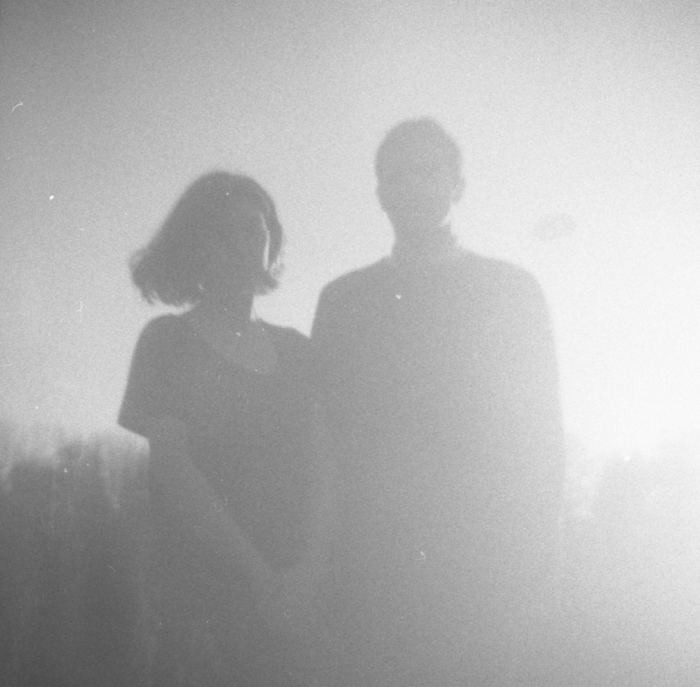Purveyors of: Glimmering synth-pop that makes you think about your crush
File next to: Beach House, Cocteau Twins, DIIV
Playing: WL18, Sunday, February 18 @ The Garrison. Get tickets here!
You’ll Never Get To Heaven is a London, Ontario dream pop duo formed by Chuck Blazevic and Alice Hansen. Combining ambience, intimacy and texture, You’ll Never Get to Heaven are known for creating a sound that both enamors and haunts their listeners. Wavelength’s Dora Boras talked to them about the inspiration behind their latest album, Images, and the lasting allure of dream pop.
What was the songwriting process like for Images? Did you have any influences or influential experiences? How have you changed as a musician since Adorn?
Alice: The process was very casual and intuitive. We experimented with creating and combining textures, writing melodies over selected chords, and working on the mixes until the tracks felt complete. Since Adorn, we’ve become hugely inspired by a lot of ambient and minimal music from the around world, mostly recorded during the 1980s and early ’90s. Our major musical influences during the making of Images are featured on these mixes.
Dream pop has this very atmospheric tone that feels intimate but consuming all at once. Is there something about these qualities that attracted you to this genre specifically?
Chuck: We are intuitively drawn to music that occupies a space between intimacy and distance. While it’s commonly manifest in dream pop, we also find, and are attracted to, this feeling in a variety of music — old piano recordings of Debussy and Ravel, early ’60s girl group 45s, Spot-produced Hüsker Dü, and solo recordings by the likes of Dominique Lawalrée, Colette Roper, Suso Sáiz, Loren Connors, etc. It’s music that grows with you over time — beautiful on the surface, but with enough imperfection to give it some depth and lasting power. It’s difficult to say why we have an emotional response to certain qualities in music or why we enjoy them, but we absolutely do.
The seventh track on the album, “Beyond the Clouds”, is for sure my favourite. The little bass riff throughout the song is uncomplicated but super catchy and has a very emotional effect. Can you tell us a little more about that track?
Alice: Thank you for the kind words! It’s funny because we almost didn’t include “Beyond the Clouds”on the album. The last song we wrote was “White Light” and after stepping back and looking at the whole thing, we wondered if we should make the album more instrumental and ambient by leaving out some of the faster, catchier songs. Ultimately, we’re glad we kept it on the record. It was a lot of fun to play live on tour with the lead bass line, drums and vocals. There are also lots of subtle ambient sounds and textures woven throughout the mix, which adds another dimension to “Beyond the Clouds” and helps keep it consistent with the album as a whole.
The video for “Beyond the Clouds” has a sort of old-home-movie/found footage/dare-I-say-“vintage” appeal. Your Instagram as well has a certain sentimental haze to it. How important are visuals to you? Were you interested in a sense of nostalgia when making the video? Why does film compliment your music so well?
The video for “Beyond the Clouds” was entirely conceived, produced and directed by LA- based artist Pinky Ortiz, who has this to say about it: “Conceptually I wanted to present something along the lines of a lost demo reel – like missing scenes from a Derek Jarman or Kenneth Anger film (with queer, sorrow, and Hellene undertones). All of the footage was shot on Super 8 film stock, and edited alongside clips from features that I felt likened and elevated the emotionality of the song.”
I noticed on your Bandcamp that you tagged your albums as “haunting.” Why do you feel that word best describes your music and the kind of listening experience you create for your audience?
Chuck: Early on we noticed people using this adjective to describe our music, which I think can be attributed to the balance of elements at play in music — bleary tones, hushed vocals, echo and reverb treatments, resonant and affected classical instrumentation (harp, piano, strings) — and our bias toward melancholic melodies and minor-key compositions.
— Interview by Dora Boras

